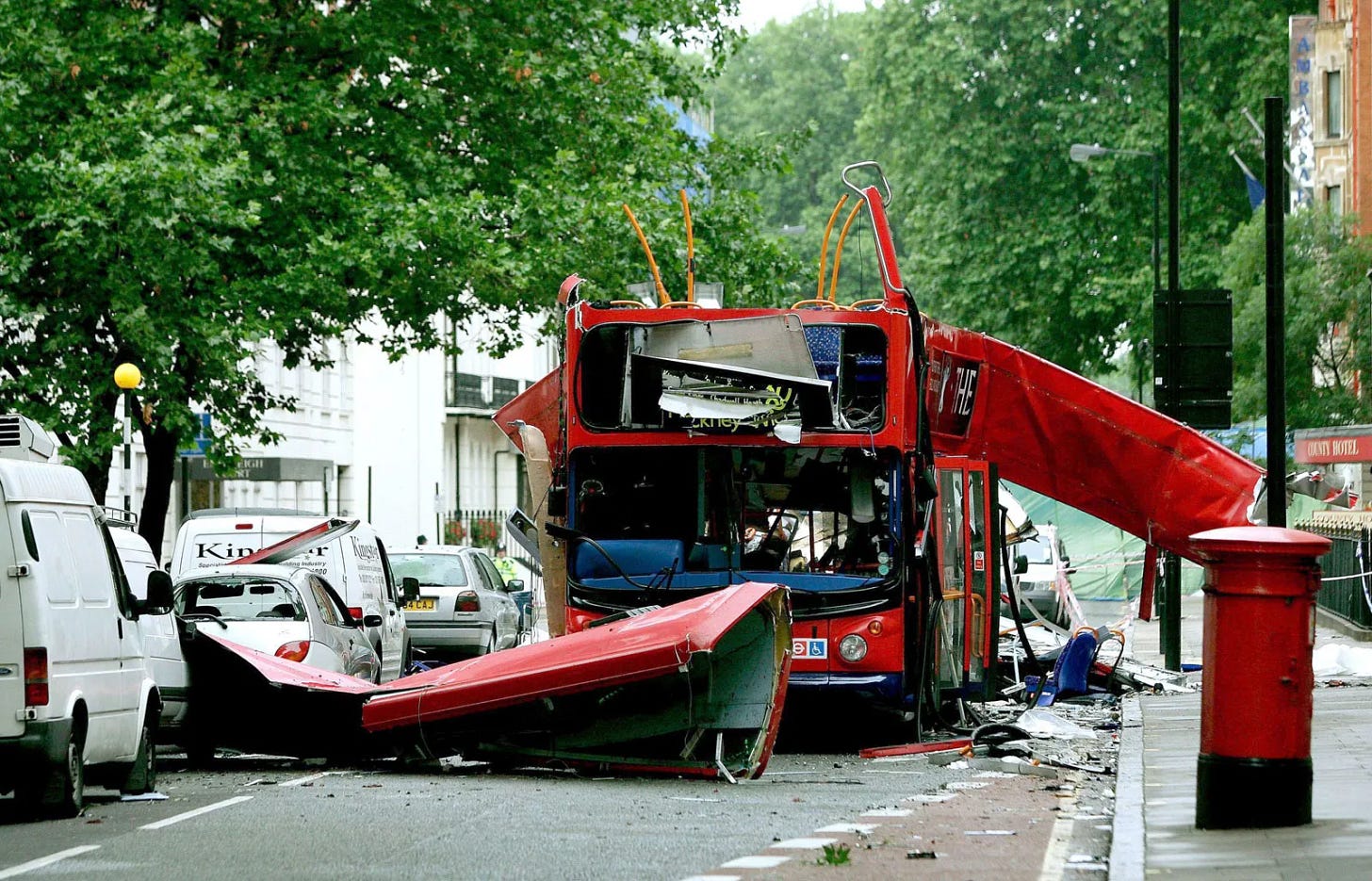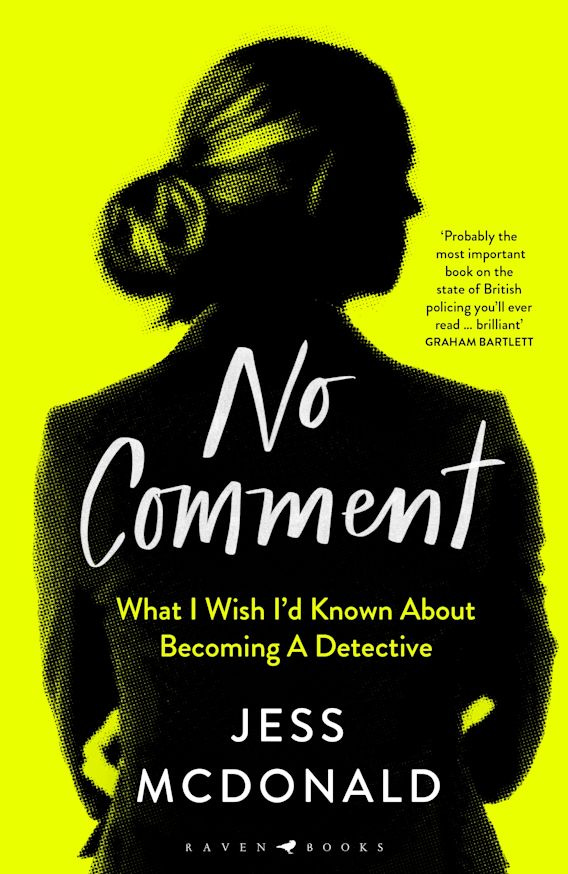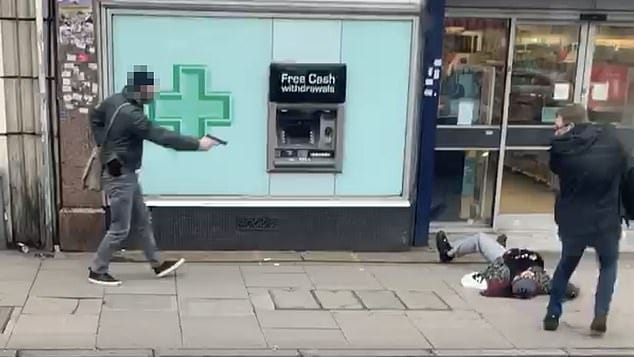Tavistock Square, July 2005.
A friend drew my attention to a recruitment advert offering fast-track access to counter-terrorism policing. Graduate entrants are offered the chance to join Police Now’s direct-entry detective programme, ending in a guaranteed posting (in the MPS) to SO15 – the Counter Terrorism Command.
To the Safeguarding Hub you go! Read the small print - they won’t let you near CT for 15 whole months
Serendipitously, another friend mentioned a book called ‘No Comment’ by Jess McDonald. Jess joined the Met (about the same time I retired) as a direct-entry detective. She resigned shortly after qualifying, and the picture she paints isn’t pretty. Elements of her story chime with what other direct entrants have told me, especially marooning trainees in the stressful and woefully under-resourced world of safeguarding and sexual offences.
Yes, Jess has a book to sell, and some of the marketing is likely to raise hackles (especially by those opposed to direct-entry CID officers in the first place). That doesn’t mean she doesn’t have a point.
Direct entry CID, and recruits like Jess, aren’t only designed to fill the staffing void created by Theresa May’s tenure as Home Secretary. It’s also an attempt to engineer culture change in the Met. The problem is, the battle her cohort faces is similar to the beginning of the movie ‘Enemy at the Gates’ – there’s only one rifle per twenty conscripts and they’re ruthlessly ushered into withering machinegun fire.
On the one hand, I understand why the police want to attract young, educated women like Jess - people who’d never countenance two years of wearing uniform (although I’m still of the view it should be compulsory - there’s some stuff you can only learn on the street). I also think chucking hundreds of Jess’s into the fray and hoping enough survive to eventually change the culture is cynical, unfair and ultimately a waste of money. She also makes a point I’ve mentioned before – there’s no point introducing a controversial new initiative without buy-in from the ground floor.
These programs (along with the ill-fated graduate entry / apprenticeship routes) were inflicted on the Job without ever being accepted by the rank-and-file. I’ve considered the reasons for this resistance before, when I wrote about compulsory degrees for police officers. It didn’t help the experts advocating these schemes were often defensive and condescending when challenged.
Jess McDonald describes a broken system in terms of culture, training, performance and retention
Jess accepts she fell for the myths depicted in detective dramas and movies. If she’d done her due diligence, she’d have realised being a local detective is one of the crappiest jobs in the police. A young detective I knew (in a county force), after finishing the uniform attachment at the start of her training, actually preferred it and wanted to ditch being a detective altogether. Why else d’you think they’re luring people into CID with the promise of being Jack Bauer?
The SO15 direct entry detective spiel (a short-cut into national security action) versus the reality (a la Jess McDonald’s experiences, as the two programs are startling similar) prompted me to consider a sweary evisceration of the whole direct-entry system. It would be fun and cathartic. It would receive a whole load of page views (my angrier pieces usually do). But would it add anything of value to the debate?
Probably not.
Instead, I’ve decided to chew the fat. Are there any nostalgia-free lessons from the past? And what does the future – including direct entry SO15 detectives – hold?
And, most importantly, will it work?
This is where I qualify why I’ve something to add to the conversation. I served in Special Branch and SO15 on-and-off for nearly 14 of my 25 years in the Job. I was a substantive detective constable. I’ve also worked on CT operations involving every flavour of murderous nutcase, from the Provisional IRA to Al Qaeda. I even did a stint on the SO15 Alexander Litvinenko murder investigation (who’s the suspect? Er, Russia).
However (and this is important), some CID officers might suggest I was never a ‘proper’ detective, as I didn’t undergo the ‘traditional’ route; local crime squad, trainee investigator on a borough then substantive detective. When I tried that as crime squad PC in 1995, Paul Condon helpfully closed the detective training school. One colleague waited nearly seven years to complete his DC’s process (he transferred to a northern English force and became a DC there). So I joined special branch instead (we were given ‘honorary’ detective status). SB officers used to undertake the CID course, but this ended shortly before I joined.
Anyhow, fast forward thirteen-odd years and a number of specialist postings later, I finally became a substantive detective.
My point? The Met has always had an inconsistent attitude to detective selection, accreditation and deployment. Counterterrorism’s a good example – many SO15 officers aren’t detectives. They’re police constables, sergeants and inspectors (etc) working in a plainclothes role (some detectives sometimes unhelpfully described them as ‘wood made good’, as in the derogatory term for uniform cops, Woodies or Woodentops). Most police surveillance and intelligence officers, for example, are police constables – their role doesn’t involve arrests, interviews, statement-taking and case-building. They quite simply aren’t required to be detectives.
In fact, it was possible to be a PC and spend your entire service in non-uniformed roles. It even got to the point where being a substantive detective became a hindrance to career development – if a role didn’t involve the prosecutorial side of the business, detectives were barred from applying. This meant swathes of interesting jobs in surveillance, intelligence, source-handling and so on were performed primarily by non-detectives. Yet having a mix of detectives in these roles is important, as the majority of police activity turns on evidential outcomes - and a prosecutorial focus is a detective’s speciality. But no, they were urgently required on the borough coalface (see below).
An armed surveillance officer engages a terrorist suspect in Streatham, London, 2020. These officers are not usually detectives.
Detectives have a very specific role of investigation and case-building. Of course, there’s a whole load of other stuff going on, but a good detective always has one thing at the back of their mind, something non-detectives occasionally don’t (I’ll include myself in that at certain points in my service) - how does the stuff we’re doing fit in evidentially, in crown court, two years from now?
This is why a good detective is worth their weight in gold when it comes to seemingly mundane stuff like handling exhibits, scene management, witnesses, interviewing suspects, dealing with disclosure and the CPS. A detective is a paralegal as much as a police officer. The skillset is diverse, demanding and… woefully underappreciated. Then there’s going to court and seeing your evidence filleted by a clever barrister - a key learning moment in any detective’s career. Again, you can’t teach that experience. This is partly why I’m sceptical of direct entry detectives - in my day most uniform officers would have already had courtroom experience before even applying for CID.
And yet, despite numerous warnings from officers of all ranks, the status of detectives atrophied. Fewer senior officers with meaningful CID experience ascended the greasy pole. Then there was the post-2012 meltdown (Baroness Casey’s report describes how local CID was sacrificed during this period in favour of specialist units. I write about this here).
How did this play out on the ground?
Even before 2012, CID had mutated into a performance management factory. Detectives were chained to their CRIS machines, feeding the Home Office Counting Rules (HOCR) and sanctioned detections regimes demanded by senior officers and politicians (these statistics were meaningless and ruthlessly gamed). It was bullshit of the most galling kind, all commonsense chucked out of the window. Then there was the CPS to contend with (who have their own ravenous performance monster to satisfy), who Sir Mark Rowley finally called out last week.
Then, after 2012, it got even worse.
My take? Direct entry detectives are lambs led to slaughter, by an organisation which knows it’s unable to recruit internally. Most officers who complete two years in uniform know CID’s a nightmare posting.
As Jess McDonald discovered, you can’t polish a turd. You can roll it in glitter, though, which is what the SO15 direct entry recruitment spiel is trying to do.
Funnily enough, I saw similarities in attitudes towards direct-entry detectives and my personal experience of special branch in the mid-1990s. After all, Met SB was one of the only central departments happy to take fairly young-in-service officers (I had 3.5 years service when I was accepted). Selection was fiercely competitive, with a bias towards graduates, ex-military types and people with language skills (I had two out of the three). Candidates had to sit a general knowledge and report-writing test (known colloquially as ‘The Pub Quiz’). They had to pass Developed Vetting. Then you’d see SB officers doing ‘zero-to-hero’ stuff like working on counterterrorism operations, on surveillance teams, in fairly high-level intelligence cells and so on. Some SB officers excelled. Others didn’t. Was it elitist? I think the Branch liked to think it was. It was certainly part of its downfall.
In any case, much of the Job disliked SB for this. A common criticism from CID (some of it warranted) was SB were ‘gentlemen, not players’. When CID finally got rid of SB in 2006 it was fairly medieval, the Met’s robber-barons ripping the department limb-from-limb. SO15, like the alien bursting from John Hurt’s stomach, was the result.
So excuse me if I allow myself a wry smile watching SO15 playing a far more desperate game of zero-to-hero with its Police Now program. If the stakes weren’t so high, I might even chuckle. But I won’t, because the stakes are very, very high indeed. Take another look at the picture of that bus in Tavistock Square, or the surveillance operator on Streatham High Road.
This is serious stuff.
I’m fairly certain Jack Bauer has never compiled a disclosure schedule
Although, if you read the fine print of the SO15 direct entry program, you’ll see it’s more or less the same one Jess McDonald signed on for. The only difference is, from their 15th month of service, they’ll be slowly introduced to CT work. By that time they’ll already have been on borough CID (not for long, but enough to make them realise they’ll never want to go back) and hopefully not be a complete liability.
The real lynchpins of this program, if it’s going to work, will be the already put-upon detective sergeants keeping an eye on their rookie charges. I imagine these newly-minted CT detectives will find their role quite mundane, mainly due to the machinelike nature of SO15 operations (which generally come in two flavours - proactive and reactive). Meanwhile the Security Service is in the chair during most proactive work, spinning its webs behind closed doors. Some detectives from a proactive crime background, used to running their own ops, find this deeply frustrating. I knew a Flying Squad detective, a genuinely talented copper, who left SO15 after six months due to sheer boredom with CCTV trawls, disclosure and generally twiddling his thumbs. In fact, I’d say to any budding detective who genuinely wants to do it all is join the Flying Squad.
SO15? Jack Bauer it ain’t.
Then there’s the part where detectives are definitely in the chair - reactive investigations. A bomb going off and causing fatalities remains, after all, a murder. This is where the more methodical and less swashbuckling MIT team-type ‘tec is in his or her element. HOLMES suites. Actions. Statement taking. Depending on the sort of copper you are, this is either deeply satisfying or stupefyingly dull. Also, given the cliquey nature of some ‘pods’ of SO15 detectives, it’s not uncommon to see favoured officers getting all of the best enquiries. It’s a bit galling to see the same three people get all the actions involving flying to interesting places, after all. The rest end up with the interminable CCTV trawls and viewing.
Such work might be dull, but it’s important; I’m not sure it’s a job for someone with only 15 months in the police. Then again, I suppose CT has changed over the past decade. SO15 officers now arrest people involved in peripheral terrorist activity like fundraising, travelling unlawfully to conflict zones, kids downloading terrorist material from the internet and all sorts of other relatively low-level stuff compared to bomb plots. Maybe this is the sort of work where direct entrants will cut their teeth?
Last but definitely not least, though, is the impact of having a cadre of detectives who’ve only ever really worked in CT. They won’t have any impactful connection to the wider force they work for. Say twenty five percent of Police Now direct entrants stay (I think they’d be delighted with that). Over time, the golden thread running through British CT policing - the critical link between mainstream policing and specialist units - will slowly begin to unravel.
Eventually you’ll create a CT culture even more divorced from the rest of the MPS. Then again, I wouldn’t be surprised if SO15 was gobbled up by the NCA and it won’t matter. Those guys already zero-to-hero in a big way. I’ve met a few spotty twentysomethings from Britain’s federales who couldn’t detect a turd in a fruit salad. They’ll still happily tell you they enjoy the powers of a cop, a customs officer, an immigration officer and probably a cheese inspection and quality control agent too.
Anyhow, I suppose counterterrorism is like a benign sort of parasite, requiring a healthy host on which to feed - i.e. the police force it’s part of. The host provides staff, expertise and resources and in return the parasite does CT stuff. As the Met - the host - is sucked dry, the parasite also begins to wither.
This is how SO15 ran out of detectives. This is why its been forced to recruit directly.
The irony? The then Commissioner, Lord Bernard Hogan-Howe (as Baroness Casey reveals) made the decision to protect the Met’s crown jewels, departments like SO15, when the funding taps were turned off. This was explicitly at the expense of local policing. Yet, amazingly, he didn’t seem to realise - or care - how symbiotic that relationship was. He was robbing Peter to pay Paul.
And another irony. Guess who his deputy was? Step forward Sir Mark Rowley, the current Commissioner of the Metropolitan Police.
Now, if you don’t mind, I’m off for a stiff drink.







Brilliant and 100% spot on. I was a DC on MIT during the London bombings and was considering CT as my next move. I was sent on attachment and, as much as i enjoyed it, i realised the difference between CT and MIT. Firstly, on CT, every role went up a rank. So the SIO was a DSU not a DCI. On MIT we had weekly meetings where we discussed the job in hand, knew everything about the job and felt part of a team and were making a contribution. On CT the DCs role became no more than a messenger. “Take this statement” “What about?” “You don’t need to know, just take his statement “. As a detective who took pride in seeing a job through from start to finish it put me off.
Even DS’s were often in the dark. Mate of mine didn’t even realise his role in a CT job until the court case was on the news!
Another interesting read, amusing and worrying, our police service is being taken to pieces without any strategic plan in place. Home Sec, PCC’s and Chief Officers appear to be looking the other way whilst a vital public service is destroyed by a thousand cuts (££££’s)
The facts are, specialist departments are no longer seen as attractive, with poor remuneration (pay and overtime) it’s better to work shorter hours, enjoy home life and wait until a better career pops up. Policing is no longer a ‘job’ for life for many. Offering a role on CID or SO15 May attract some candidates, until they realise they have been mugged!
We need a Home Secretary and government that are interested in more than people on boats in the channel.